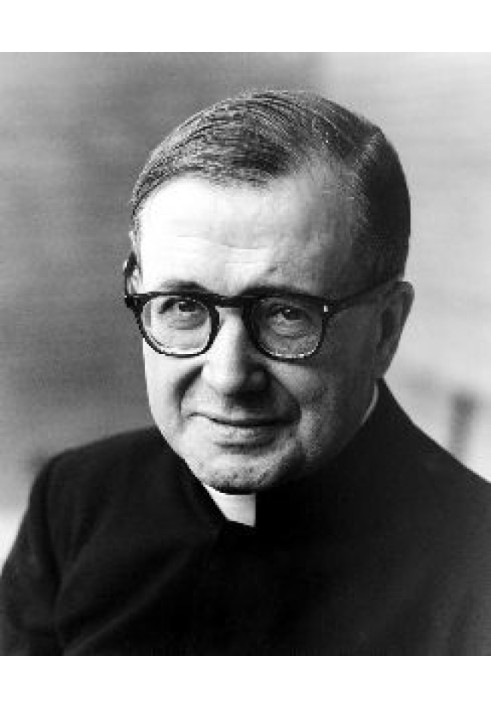articles
 Instant download
Instant download
after payment (24/7)
 Wide range of formats
Wide range of formats
(for all gadgets)
 Full book
Full book
(including for Apple and Android)
Saint Josemaria Escriva de Balaguer (Spanish: Josemaria Escriva de Balaguer, born January 9, 1902, Barbastro, Spain - June 26, 1975, Rome, Italy) - founder of Opus Dei, an organization of the Catholic Church. Born January 9, 1902 in the city Barbastro, in the province of Huesca. At the age of 15 or 16, he felt a calling to serve the Lord and decided to become a priest. From 1918 he studied at the Seminary in Logrono, and then, from 1920, in Zaragoza. In 1923, with the permission of the church authorities, he studied at the Faculty of Civil Law at the University of Zaragoza. On December 20, 1924, he was ordained a deacon, and on March 28, 1925, he became a priest. He began his ministry in the small parish of Perdighera, belonging to the Diocese of Zaragoza. Then he served as a priest in Zaragoza. In the spring of 1927, from permission of the Archbishop, he moved to Madrid, where he launched tireless priestly work in various social groups, paying special attention to the poor residents of the urban outskirts, as well as the terminally ill and dying in hospitals and shelters. He became the chaplain of the Foundation for Assistance to the Sick, a charitable institution of the Apostolic Women of the Sacred Heart of Jesus. At the same time, he, a professor at the University Academy, continued to work on his doctorate in civil law, which could only be completed at the University of Madrid. On October 2, 1928, Saint Josemaría Escrivá founded the organization Opus Dei. In 1934, the Founder of Opus Dei was appointed Rector of the Foundation Saint Elizabeth. When the civil war began in Spain, he carried out his mission at great risk to his life. priestly duty in Madrid and later in Burgos. On February 14, 1943, he founded the Priestly Society of the Holy Cross, which was inextricably linked to Opus Dei and allowed the ordination of priests from lay members of Opus Dei. Subsequently, the Priestly Society of the Holy Cross allowed priests incardinated in different dioceses to share the spirituality and asceticism of Opus Dei and seek holiness in the performance of their priestly duty, while depending solely on their diocesan bishop. In 1946, Father Escrivá chose Rome as his residence, where he remained until the end of his life. From Rome he encouraged and directed the spread of Opus Dei throughout the world. At the time of the death of its Founder, Opus Dei numbered more than 60 thousand members of 80 nationalities. Saint Josemaría Escrivá was a Pontifical Councilor Commission for the Correct Interpretation of the Code of Canon Law and the Holy Congregation of Seminaries and Universities, Honorary Prelate of His Holiness and Honorary Academician of the Pontifical Roman Theological Academy. He was also Chief Chancellor of the University of Navarre (Pamplona, Spain) and the University of Piura (Piura, Peru). Josemaría Escrivá died on June 26, 1975. He was buried in the crypt of the Church of the Blessed Virgin Mary, Lady of the World (Regina Pacis), in Rome. On September 15, 1975, Father Alvaro del Portillo, his closest collaborator for many years, was unanimously elected as the founder's successor. After Josemaría's death, many letters were received from all five continents addressed to the Pope. Among the senders are 69 Cardinals and about 1300 Bishops (more than a third of the world's Episcopate), who asked The Pope to open the case for the beatification and canonization of Father Josemaría Escrivá. On January 30, 1981, the Congregation for Canonization recognized that there were no obstacles to the opening of the process (nihil obstat). John Paul II ratified this decision on February 5, 1981. Between 1981 and 1986, two trials were held - in Madrid and in Rome - dedicated to the life and virtues of Father Josemaría Escrivá. Based on the results of both processes, and taking into account the favorable opinion of the Congress of Theological Councilors and the Commission of Cardinals and Bishops - members of the Congregation for Canonizations, on April 9, 1990, the Holy Father proclaimed the heroic virtues of Father Josemaría Escrivá and conferred on him the title of Venerable. On July 6, 1991, the Pope ordered the promulgation of the Decree, declaring a miraculous cure of the disease thanks to the intercession of Josemaría Escrivá. Thus, the legal stage preceding the beatification of the founder of Opus Dei was completed. On May 17, 1992, Josemaría Escrivá was beatified, and on October 6, 2002, he was canonized during the Divine Liturgy celebrated by Pope John Paul II in St. Peter's Square in Rome. Since May 21, 1992, the body of Father Josemaría Escrivá rests in the headquarters of the Prelature of Opus Dei, in the altar of the Church of the Blessed Virgin Mary. Saint Josemaría Escrivá is the author of the legal-theological treatise “La abadesa de las Huelgas” and spiritual books translated into many languages peace. These are “The Way”, “The Holy Rosary” and “Christ Passes Nearby”, as well as “The Lord’s Neighbors”, “The Way of the Cross”, “Loving the Church”, “The Furrow” and "The Forge", published after his death. In addition, the book Conversations with Father Escrivá collected interviews given by him over many years and published in various periodicals.
Data sheet
- Name of the Author
- Хосемария Эскрива
- Language
- Russian














